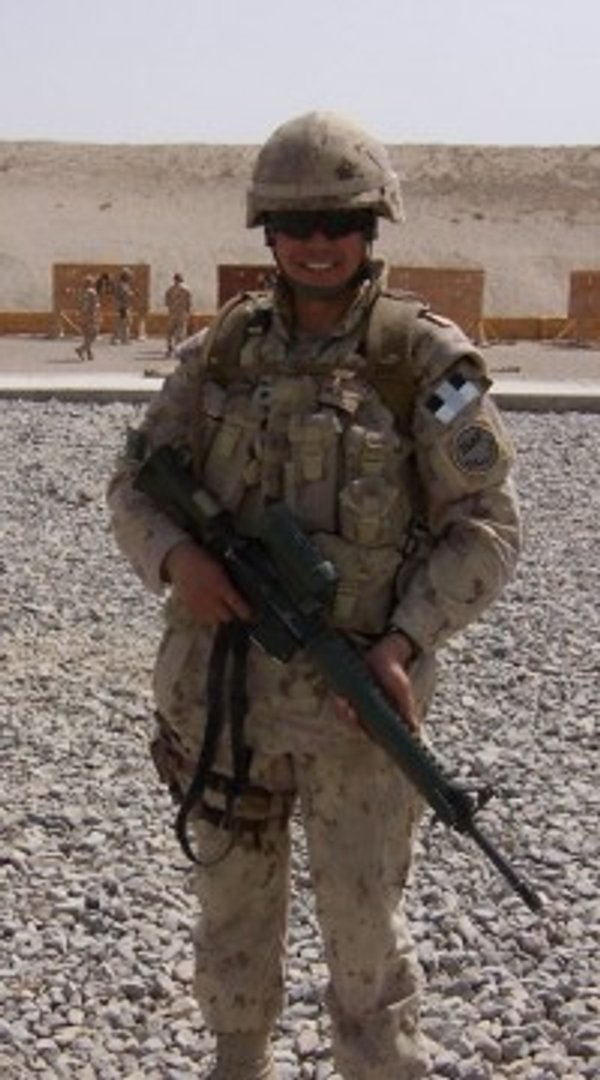In the controversy surrounding Canada’s military involvement in Afghanistan, it is easy to forget that Afghanistan asked Canada to send soldiers and that Canadian soldiers go to Afghanistan voluntarily. I recently spoke with a soldier about this in the Regis College library in Toronto. A Jesuit college might seem like a strange place to discuss a soldier’s mission but, as Capt. Joe Nonato of the Royal Regiment of Canada points out, St. Ignatius of Loyola was himself a soldier. Catholic tradition carries with it many military metaphors and many military saints. Nonato sees no contradiction between his duties as a soldier and as a religion teacher at Toronto’s De La Salle school.
Nonato, whose family emigrated from the Philippines, says that he joined the armed forces in part because he comes from a military background, but also because he loves Canada and feels a need to serve. “The church teaches us that the reason why we’re here is to serve. People have very different vocations that God gives us, and part of my professional calling is the military.”
But is it tough to be Catholic in the military? Nonato likens the military environment to a football team, complete with locker room talk.
“It’s a test of faith,” he admits, “a test of your strength. Obviously the armed forces is a reflection of our society. As for the culture within it, you do have to be a tough guy
. . . . Being a Catholic there is a bit of a reminder that we have a duty not only to bring ourselves to heaven and bring other people to heaven. When I’m praying, I’m not just doing it for myself. Nobody’s ever called me a Holy Joe. People tend to respect those who are virtuous. If you’re standing up for something, and that something is right, people will respect that.”
Other Catholics have asked him if soldiery is contrary to what Christ taught, or to the church. “But the thing is, it’s not,” said Nonato. “We’re described as a family, but we’re also described as an army, the Church Militant. If you look at the catechism, it’s basically talking about wanting the peace of Christ, but understanding that we live in a world that suffers from original sin. There has to be someone to bring that peace or that justice. Peace is not the absence of conflict. There has to be human rights and a recognition of the dignity of the human person.”
Nonato agrees that Canada is a peace-loving country but says it is also a country that has known how to stand up for itself and for others. He points to the numerous war monuments around Toronto. “Peace comes at a cost. As a first world country, we owe something to others. We cannot just sit here selfishly and let others suffer. We are in Afghanistan because Afghanistan asked us to be there, to help get themselves together, to bring back rights, to bring back freedoms.”
Nonato is slated to be in Afghanistan himself later this year. He will work as a psychological operations officer, battling Taliban propaganda. Home will be a plastic hut with a concrete floor in Kandahar, and his church community will look a lot different. Nonato is a member of Opus Dei, and may be the only one in Kandahar. But normally there is a priest there — the Americans always have a priest as their Catholic chaplain. He’s glad. “Being separated from the sacraments would be a complete horror story,” says Nonato. “I see receiving the Eucharist as our life source.”

There are, of course, other frightening possibilities in Afghanistan, but Nonato says that he is not scared. “There is the possibility of dying here too. For Christians, death is not something that we fear because Jesus died. It’s not how we die that matters, it’s how we live.”
But what about the Taliban? “We pray for our enemies,” says Nonato, “but we have to protect our own lives. Meanwhile, we have to trust our government. We weren’t the ones who picked the fight.”
Although Nonato’s whole career, beginning with his Royal Military College days, has been a preparation for this mission, he also prepared spiritually with a silent retreat. The ancient fraternity of the army is also a help. “We train each other to take care of each other,” he explains. He feels strengthened knowing that others are counting on him.
Looking at the soldier’s green-and-brown uniform, I can’t help asking, “So are you a brown scapular man?”
“Yes I am,” says Nonato. “From a Carmelite perspective, the brown scapular is a uniform, too.”
He looks down at his chest. He’s got a medal of St Benedict in there too. “I guess when people realize you’re going off somewhere dangerous, they want to give you these things.”
Article originally appear on May 23, 2008 in "The Catholic Register" (article here) Joe's blog can be found here
